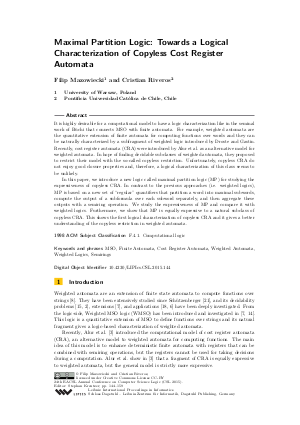Maximal Partition Logic: Towards a Logical Characterization of Copyless Cost Register Automata
Authors Filip Mazowiecki, Cristian Riveros
-
Part of:
Volume:
24th EACSL Annual Conference on Computer Science Logic (CSL 2015)
Part of: Series: Leibniz International Proceedings in Informatics (LIPIcs)
Part of: Conference: Computer Science Logic (CSL) - License:
 Creative Commons Attribution 3.0 Unported license
Creative Commons Attribution 3.0 Unported license
- Publication Date: 2015-09-07
File

PDF
LIPIcs.CSL.2015.144.pdf
- Filesize: 0.52 MB
- 16 pages
Document Identifiers
Subject Classification
Keywords
- MSO
- Finite Automata
- Cost Register Automata
- Weighted Automata
- Weighted Logics
- Semirings
Metrics
- Access Statistics
-
Total Accesses (updated on a weekly basis)
0PDF Downloads0Metadata Views
Abstract
It is highly desirable for a computational model to have a logic characterization like in the seminal work from Buchi that connects MSO with finite automata. For example, weighted automata are the quantitative extension of finite automata for computing functions over words and they can be naturally characterized by a subframent of weighted logic introduced by Droste and Gastin. Recently, cost register automata (CRA) were introduced by Alur et al. as an alternative model for weighted automata. In hope of finding decidable subclasses of weighted automata, they proposed to restrict their model with the so-called copyless restriction. Unfortunately, copyless CRA do not enjoy good closure properties and, therefore, a logical characterization of this class seems to be unlikely. In this paper, we introduce a new logic called maximal partition logic (MPL) for studying the expressiveness of copyless CRA. In contrast from the previous approaches (i.e. weighted logics), MPL is based on a new set of "regular" quantifiers that partition a word into maximal subwords, compute the output of a subformula over each subword separately, and then aggregate these outputs with a semiring operation. We study the expressiveness of MPL and compare it with weighted logics. Furthermore, we show that MPL is equally expressive to a natural subclass of copyless CRA. This shows the first logical characterization of copyless CRA and it gives a better understanding of the copyless restriction in weighted automata.
Cite As Get BibTex
Filip Mazowiecki and Cristian Riveros. Maximal Partition Logic: Towards a Logical Characterization of Copyless Cost Register Automata. In 24th EACSL Annual Conference on Computer Science Logic (CSL 2015). Leibniz International Proceedings in Informatics (LIPIcs), Volume 41, pp. 144-159, Schloss Dagstuhl – Leibniz-Zentrum für Informatik (2015)
https://doi.org/10.4230/LIPIcs.CSL.2015.144
BibTex
@InProceedings{mazowiecki_et_al:LIPIcs.CSL.2015.144,
author = {Mazowiecki, Filip and Riveros, Cristian},
title = {{Maximal Partition Logic: Towards a Logical Characterization of Copyless Cost Register Automata}},
booktitle = {24th EACSL Annual Conference on Computer Science Logic (CSL 2015)},
pages = {144--159},
series = {Leibniz International Proceedings in Informatics (LIPIcs)},
ISBN = {978-3-939897-90-3},
ISSN = {1868-8969},
year = {2015},
volume = {41},
editor = {Kreutzer, Stephan},
publisher = {Schloss Dagstuhl -- Leibniz-Zentrum f{\"u}r Informatik},
address = {Dagstuhl, Germany},
URL = {https://drops.dagstuhl.de/entities/document/10.4230/LIPIcs.CSL.2015.144},
URN = {urn:nbn:de:0030-drops-54127},
doi = {10.4230/LIPIcs.CSL.2015.144},
annote = {Keywords: MSO, Finite Automata, Cost Register Automata, Weighted Automata, Weighted Logics, Semirings}
}
Author Details
References
-
V Alfred. Algorithms for finding patterns in strings. Handbook of Theoretical Computer Science: Algorithms and complexity, 1:255, 1990.

-
Shaull Almagor, Udi Boker, and Orna Kupferman. What’s decidable about weighted automata? In ATVA, pages 482-491, 2011.

-
Rajeev Alur, Loris D'Antoni, Jyotirmoy Deshmukh, Mukund Raghothaman, and Yifei Yuan. Regular functions and cost register automata. In Proceedings of the 2013 28th Annual ACM/IEEE Symposium on Logic in Computer Science, pages 13-22. IEEE Computer Society, 2013.

-
Benedikt Bollig, Paul Gastin, Benjamin Monmege, and Marc Zeitoun. Logical characterization of weighted pebble walking automata. In Proceedings of the Joint Meeting of the Twenty-Third EACSL Annual Conference on Computer Science Logic (CSL) and the Twenty-Ninth Annual ACM/IEEE Symposium on Logic in Computer Science (LICS), page 19. ACM, 2014.

-
Thomas Colcombet, Clemens Ley, and Gabriele Puppis. On the use of guards for logics with data. In Mathematical Foundations of Computer Science 2011, pages 243-255. Springer, 2011.

-
Karel Culik II and Jarkko Kari. Image compression using weighted finite automata. In Mathematical Foundations of Computer Science 1993, pages 392-402. Springer, 1993.

-
Manfred Droste and Paul Gastin. Weighted automata and weighted logics. Theor. Comput. Sci., 380(1-2):69-86, 2007.

-
Manfred Droste, Werner Kuich, and Heiko Vogler. Handbook of Weighted Automata. Springer, 1st edition, 2009.

-
Ronald Fagin, Benny Kimelfeld, Frederick Reiss, and Stijn Vansummeren. Spanners: a formal framework for information extraction. In Proceedings of the 32nd symposium on Principles of database systems, pages 37-48. ACM, 2013.

-
Jeffrey Friedl. Mastering regular expressions. " O'Reilly Media, Inc.", 2006.

-
John E. Hopcroft and Jeffrey D. Ullman. Introduction to Automata Theory, Languages and Computation. Addison-Wesley, 1979.

-
Benny Kimelfeld. Database principles in information extraction. In Proceedings of the 33rd ACM SIGMOD-SIGACT-SIGART symposium on Principles of database systems, pages 156-163. ACM, 2014.

-
Ines Klimann, Sylvain Lombardy, Jean Mairesse, and Christophe Prieur. Deciding unambiguity and sequentiality from a finitely ambiguous max-plus automaton. Theor. Comput. Sci., 327(3):349-373, 2004.

-
Stephan Kreutzer and Cristian Riveros. Quantitative monadic second-order logic. In Proceedings of the 2013 28th Annual ACM/IEEE Symposium on Logic in Computer Science, pages 113-122. IEEE Computer Society, 2013.

-
Daniel Krob. The equality problem for rational series with multiplicities in the tropical semiring is undecidable. In ICALP, pages 101-112, 1992.

-
Leonid Libkin. Elements of finite model theory. Springer Science & Business Media, 2004.

-
Filip Mazowiecki and Cristian Riveros. On the expressibility of copyless cost register automata. CoRR, abs/1504.01709, 2015.

-
Mehryar Mohri. Finite-state transducers in language and speech processing. Computational Linguistics, 23(2):269-311, 1997.

-
Christos H. Papadimitriou. Computational complexity. Addison-Wesley, 1993.

-
Jacques Sakarovitch. Elements of Automata Theory. Cambridge University Press, 2009.

-
M. P. Schützenberger. On the definition of a family of automata. Information and Control, 4:245-270, 1961.

